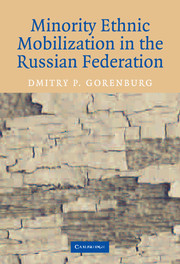Book contents
- Frontmatter
- Contents
- List of Figures and Tables
- Preface
- 1 Minority Ethnic Mobilization in Russia: An Introduction
- 2 Explaining Ethnic Mobilization: The Role of Ethnic Institutions
- 3 From Cultural Society to Popular Front: The Formation and Development of Nationalist Organizations
- 4 The Soviet Institutional Legacy and Ethno-Nationalist Ideology
- 5 Institutions Matter: Measuring Support for Nationalism
- 6 Intragroup Variation in Support for Nationalism: Not All Ethnics Are the Same
- 7 Outcomes: Did Regional Governments Adopt the Nationalist Agenda?
- 8 The Larger Picture: Support for Nationalism in Russia's Other Republics
- 9 Institutions and Nationalism
- Appendix: Construction of Variables and Indices
- References
- Index
6 - Intragroup Variation in Support for Nationalism: Not All Ethnics Are the Same
Published online by Cambridge University Press: 15 December 2009
- Frontmatter
- Contents
- List of Figures and Tables
- Preface
- 1 Minority Ethnic Mobilization in Russia: An Introduction
- 2 Explaining Ethnic Mobilization: The Role of Ethnic Institutions
- 3 From Cultural Society to Popular Front: The Formation and Development of Nationalist Organizations
- 4 The Soviet Institutional Legacy and Ethno-Nationalist Ideology
- 5 Institutions Matter: Measuring Support for Nationalism
- 6 Intragroup Variation in Support for Nationalism: Not All Ethnics Are the Same
- 7 Outcomes: Did Regional Governments Adopt the Nationalist Agenda?
- 8 The Larger Picture: Support for Nationalism in Russia's Other Republics
- 9 Institutions and Nationalism
- Appendix: Construction of Variables and Indices
- References
- Index
Summary
Responses to the nationalist message varied not only by region but also by social group. The strongest support for the nationalist message came from social groups whose members felt that they could benefit from the nationalist movement's success. Although political and economic benefits played some role in determining support for nationalism, supporters responded most strongly to the psychological benefits of higher group status inherent in a successful cultural revival or an increase in regional autonomy. The extent to which individuals responded to these psychological benefits depended primarily on the extent of their exposure to the culture, traditions, and language of their ethnic group; such exposure was greatest among people who grew up in the largely mono-ethnic rural areas and/or received an education in the ethnic group's native language.
Scholars of nationalism have paid little attention to which social groups within an ethnic group are more likely to support nationalism and why they do so. The one major exception has been Miroslav Hroch's study on The Social Preconditions of National Revival in Europe (2000). Examining the development of nationalist movements among small European ethnic groups during the nineteenth century, Hroch showed that the strongest support for nationalism invariably came from the intelligentsia and students. Members of the elite, including the ruling classes and the industrial bourgeoisie, tended to assimilate to the majority group and therefore were not much involved in the movement.
- Type
- Chapter
- Information
- Minority Ethnic Mobilization in the Russian Federation , pp. 167 - 199Publisher: Cambridge University PressPrint publication year: 2003



